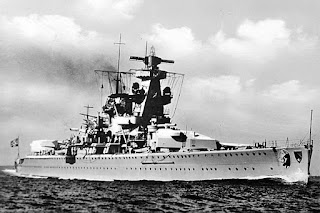Eighty years ago, war comes to the Indian Ocean and the menace of war comes to Singapore
The German commerce raider Admiral Scheer continued her highly successful cruise with a few days in the Indian Ocean where she disposed of a number of allied merchant vessels near the Seychelles. This came just after she had sunk at least six ships in a convoy in the South Atlantic. On the strength of this single sortie which lasted 155 days and covered 46,000 nautical miles. Scheer became the Kriegsmarine’s most effective surface raider, sinking a total of 17 ships of 113,000 grt. Her victims included the armed merchant cruiser Jervis Bay which had sacrificed herself to allow most of the ships in her convoy to escape. Scheer was a sister ship to the pocket battleship Graf Spee, famously sunk after the Battle of the River Plate.
Hitler continued to push his pawns into the Balkans. Germany was by far the strongest power in the region but was still moving steadily rather than aggressively. Hitler’s next move was to cover his western flank by bringing Yugoslavia into his orbit. The Prime Minister and Foreign Minister, Tsvetkovitch and Cincar-Markovitch, were summoned to the Berghof, the traditional venue his prey to be devoured. It was rumoured that they were being offered slices of territory in Albania – at the expense of Italy – and Greece – the only country actively opposing the Axis – as inducements for falling in with German plans.
Germany’s prime goal was to discourage the Balkan states from cooperating against Axis aims. In particular it wanted to head Bulgaria off from any unfriendly behaviour. Large German forces massed on Bulgaria’s northern border as a less diplomatic deterrent. Bulgaria still had sufficient room for manoeuvre to hold talks with its southern neighbour Turkey. Turkey had little appetite for active commitment in the Balkans and the talks produced nothing more than a tepid non-aggression agreement. The Turks were happy to keep Bulgaria as a kind of buffer state. Anyone reading between the lines of the British communique welcoming this agreement would have understood that London recognised that a neutral Bulgaria was the best there was to be hoped for.
Britain’s greatest Balkan dilemma concerned Greece, whose army had just won another victory – albeit a costly one – over the Italians at Trebeshina. If Greece were abandoned to its fate in the face of a powerful Germany and active German allies, Britain would lose its last chance to halt the Axis move south as well as suffering a blow to its prestige amongst neutrals elsewhere. The Foreign Secretary Anthony Eden travelled to Cairo to confer with General Wavell, the theatre commander, to discuss sending land forces to Greece.
Relations with Japan remained tense. With much publicity a brigade of Australian troops and a divisional headquarters was landed at Singapore in an ostentatious display of reinforcing the colony against any hostile movement by Japan. They were commanded by General Gordon Bennett, who had previously been passed over for a senior role overseas because of concerns over his abrasive personality. These doubts were well-founded; Gordon Bennett did not establish a happy working relationship with his British colleagues.



Comments
Post a Comment